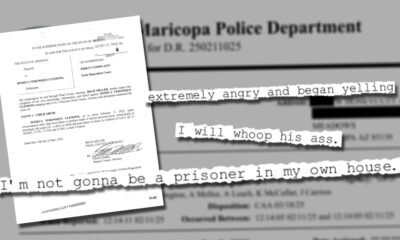crime
Mormon Bishop Accused of Failing Abuse Duty, Say Victims

Three children who were sexually abused by their father have appealed to the Arizona Court of Appeals, seeking to overturn a summary judgment that exonerated their physician. The physician did not report the abuse, citing religious confidentiality following a confession.
During Tuesday’s hearing, the attorney for the children contended that John Herrod, the bishop of a Bisbee, Arizona, Mormon congregation, relinquished his clergy privilege when he informed the children’s mother about the abuse. The plaintiffs argue that a previous ruling incorrectly stated that Herrod maintained this privilege.
Paul Adams, the father, abused all six of his children for over seven years, culminating in his arrest and subsequent suicide in 2017. His actions included the regular rape of one daughter, referred to as Jane Doe 1, starting when she was just six years old. Disturbingly, he shared videos of the abuse online, which contributed to his eventual downfall.
In 2021, three of Adams’ children filed a lawsuit against the Church of Jesus Christ of Latter-day Saints, asserting that church leaders had long been aware of the abuse but failed to act to protect their image. Among the defendants are Herrod, his wife Sherrie Farnsworth Herrod, and Lezner Medical Services, where John Herrod was the family physician.
Herrod stated in court that during a formal confession between 2010 and 2011, Adams revealed his ongoing sexual abuse of Jane Doe 1. Acting on this information, church authorities advised Herrod not to contact legal authorities. Instead, he convened a meeting with both Adams and his wife, urging her to report his actions to the police.
Although Adams confessed, his wife took no action. He later entered a guilty plea on two counts of child abuse.
John Trebon, representing the children, asserted that Herrod waived his right to clergy confidentiality by discussing the confession with Leizza Adams. He emphasized, “There’s no expectation of privacy.” According to Trebon, with the waiver of privilege comes an automatic obligation to report the abuse.
Leizza Adams corroborated in her deposition that she did not perceive the conversation with Herrod as confidential. Trebon noted that Paul’s sharing of the abuse details with his wife undermined any claim of privilege. He remarked, “The evidence is overwhelming that the conversation was never intended to remain in secrecy,” adding that Adams’ decision to post videos online further invalidated any expectation of confidentiality.
Joseph Roth, representing Herrod and his practice, pushed back against the court’s preliminary decision siding with the plaintiffs. Roth argued that allowing the ruling to stand would set a poor legal precedent. He contended that Herrod’s instructions for Leizza Adams to report her husband actually reinforced the confidentiality of the confession.
As the case progresses, plaintiffs seek to introduce new depositions regarding their relationship with Herrod as their physician. The trial judge, Timothy Dickerson, deemed this request untimely, stating it was an “egregious example of a late disclosure.” Roth supported this viewpoint, contending that allowing new testimony would unfairly disadvantage the defendants.
The children, who were only 11 years, 7 years, and 6 months old when the complaint was filed, remain central to the proceedings. Trebon highlighted the importance of their voices in this case, questioning how they can testify if discovery is closed. The panel, consisting of Judges Christopher O’Neill, Lacey Stover Guard, and Sean Brearcliffe, has yet to decide when a ruling will be issued.


















